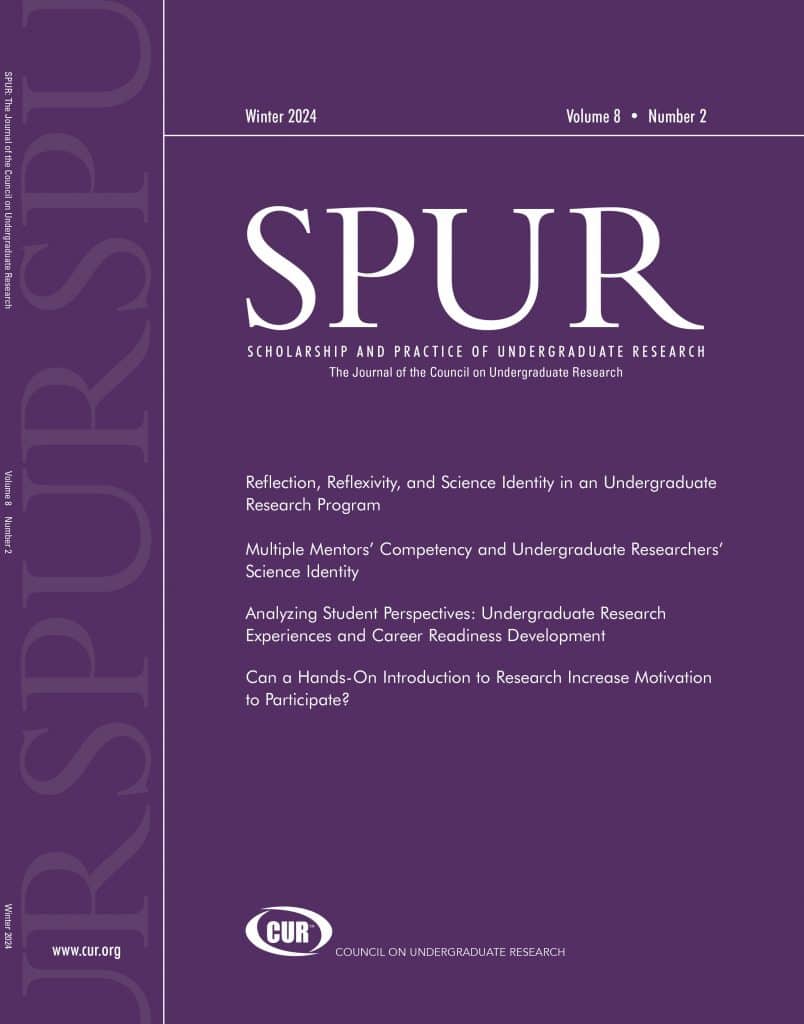SPUR (2025) 8 (2): https://doi.org/10.18833/spur/8/2/2 Abstract:
This study shares student perspectives regarding participation in an iterative reflection activity on identities that was embedded in an undergraduate research training program. The activity, which took place across multiple points in time, was designed to create space and opportunity for students with multiple, diverse identities and experiences to explore and reflect on how their identities existed together in the context of their academic research experiences. Findings suggest that the act of thinking, writing, and sharing encouraged students to reflect on their own identities, beliefs, and growth over time. This helps address the deeply embedded disciplinary cultures that can shape students’ perceptions of themselves and tensions by expressing their multiple identities in an academic research and STEM environment.
SPUR (2025) 8 (2): https://doi.org/10.18833/spur/8/2/1 Abstract:
Research experiences are important to undergraduate academic life, and many students conducted research during the COVID-19 pandemic, amid disruptions. Undergraduate researchers receive mentorship from faculty mentors and, sometimes, postgraduate mentors. Little is known about the role of multiple mentors’ competency in the science personal-identity and science social-identity of undergraduate students. Using primary data collected in 2020 (n = 841), the authors examine both faculty and postgraduate mentor competency and the impact of COVID-19 on undergraduate researchers. Having both types of mentors is beneficial for students’ science identities unless both the faculty and postgraduate mentor exhibit low competency. COVID-19 had no discernable impacts on either science identity. Findings suggest that faculty and program directors should consider mentor training to increase competency and to involve postgraduate mentors in undergraduate research experiences.
More Articles in this Issue
- Introduction‐ Patricia Ann Mabrouk
SPUR (2025) 8 (2): https://doi.org/10.18833/spur/8/2/8 Abstract:The articles in the Winter 2024 issue of Scholarship & Practice of Undergraduate Research explore a wide range of topics including mentoring, science identity, career readiness development, and hands-on activities to increase undergraduate research positivity.
- Editorial‐ Patricia Ann Mabrouk
SPUR (2025) 8 (2): https://doi.org/10.18833/spur/8/2/4 Abstract:Generative artificial intelligence is increasingly being applied in scholarly research, education, and publishing. Consequently, we need to consider how AI might be used in work appearing in Scholarship & Practice of Undergraduate Research (SPUR) and establish some guidelines for its use by prospective authors, reviewers, and this journal.
- Commentary‐ Haseeb A. Kazi, Areeba H. Kazi
SPUR (2025) 8 (2): https://doi.org/10.18833/spur/8/2/7 Abstract:In this commentary, we shall offer our readers an introduction to artificial intelligence (AI), diversity, equity, and inclusion (DEI), and the impact of AI’s newfound technological abilities on DEI in undergraduate research (UR). Our goal is to share our findings regarding AI’s potential benefits in UR and to shed light on improvements/implementations that can be made to ensure a better future in UR for students. Our examination focuses on the brief history of AI, the services it provides/can soon provide given its advancements, the impact of DEI, the ethical challenges accompanying AI, and how AI can improve DEI in UR engagement.
- Article‐ Cora Burt, Joseph Wirgau, John Brummette
SPUR (2025) 8 (2): https://doi.org/10.18833/spur/8/2/6 Abstract:The national discourse around the value of higher education has universities examining their effectiveness in developing career ready students. The National Association of Colleges and Employers has identified eight career readiness competencies employers are seeking in graduates. Undergraduate research is known to develop the most sought-after competencies of communication, critical thinking, and teamwork. A content analysis of graduating students’ reflections on the impact of undergraduate research was conducted to determine whether each of the eight career readiness competencies was mentioned. Two to three competencies were mentioned on average per reflection, with career/self-development and communication most frequently mentioned. The data were broken down and compared by demographic subgroups to determine if historically underserved groups differed from majority groups in the competencies mentioned.
- Article‐ Melissa Southwell, Madeleine Doiron
SPUR (2025) 8 (2): https://doi.org/10.18833/spur/8/2/3 Abstract:Despite the well-established benefits of undergraduate research (UR), only a minority of students participate. This study compares two ways to introduce students to UR opportunities with the goal of broadening participation. Incoming students were placed in either a hands-on or lecture-based UR introduction session and then completed surveys to evaluate their positivity toward UR. Results indicated first-generation students in the hands-on group exhibited significantly higher survey scores than those in the lecture group. Females had more positive attitudes than males, but there was no statistical difference between treatment groups. The results are discussed in the context of programmatic strategies to broaden participation in UR.
- Book Review‐ Sanga Sung
SPUR (2025) 8 (2): https://doi.org/10.18833/spur/8/2/5 Abstract:The MLA Guide to Undergraduate Research in Literature, second edition by Elizabeth Brookbank and H. Faye Christenberry provides a timely and practical resource for undergraduate students and educators navigating literary research. This updated edition incorporates changes that reflect the current research landscape, including an emphasis on digital resources, remote access, and critical evaluation strategies, addressing the demands in today’s information-rich environment.


